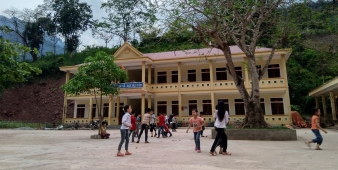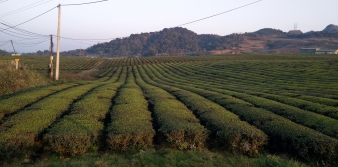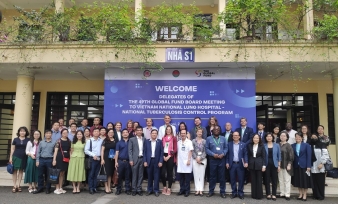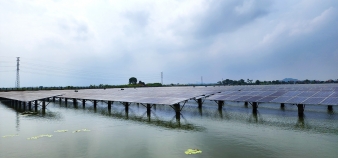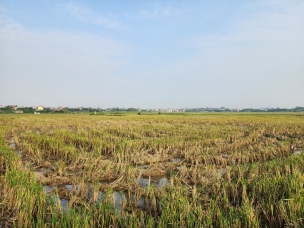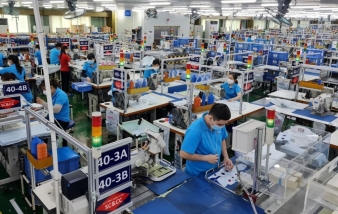40+
TRUSTED CLIENTS
80+
PROJECTS
60+
PUBLICATIONS
7000+
ENUMERATORS
Who we are
“MDRI is on its journey of imparting knowledge and making a difference.”
MDRI is ranked No.1 among economic institutions in Vietnam and is among the top 17% of 12,700 economic institutes in the world.
Our Clients
Publications
Governance and Participation – A Series of Policy Discussion Papers: Pilot Assessment of Disability Inclusion in Local Governance
Surveys done by UNDP in the past two years have shown the tremendous effects that COVID-19 has on persons with disability (PWDs) in multiple aspects such as employment, income, access to basic needs and rehabilitation services, etc. This situation requires great efforts from the Government in providing public services to support PWDs to overcome the […]
Programme-135: addressing poverty and inequality in Viet Nam
Abstract: Viet Nam has achieved remarkable economic growth and poverty reduction since the Doi Moi. However, ethnic minorities and the ethnic majority do not benefit equally from the national economic progress. The proportion of poor households that are ethnic minority-headed soared from 18 per cent in the early 1990s to 56 per cent in 2008. […]
Citizens’ Opinions of and Experiences with Government Responses to COVID-19 Pandemic in Vietnam: Findings from a phone-based survey
INTRODUCTION Viet Nam has been praised by citizens and the international community for its effectiveness in curbing the outbreak of the SARS-CoV2 pandemic (better known as the COVID-19 pandemic, or COVID-19). Since January 2020, the Government of Viet Nam (GoV) has been implementing important measures to contain COVID-19, with the most aggressive one being the […]
Report “Assessment on Employability Skills Gaps and Good Practices by Businesses to Upskill Marginalized and Vulnerable Young People”
INTRODUCTION Concerned with expanding education and building skills for future employment, the Vietnam Chamber of Commerce and Industry (VCCI), UNICEF and the Mekong Development Research Institute (MDRI) released today a report entitled “Assessment on Employability Skills Gaps and Good Practices by Businesses to Upskill Marginalized and Vulnerable Young People.” The research explores current and future […]
Female leadership and borrowing constraints: Evidence from an emerging economy
This study investigates the differences in credit access between male-managed and female-managed firms using two Enterprise Censuses in Vietnam. Our findings reveal that women-managed firms are less likely to borrow from commercial banks than their male counterparts, even when controlling for other determinants such as CEO education and experience, firm size, and ownership. No difference […]
54 Ethnic groups: Why the difference? – 2018 edition
OVERVIEW Mekong Development Research Institute (MDRI) would like to present to you the second edition of the book 54 Ethnic Groups: Why the Difference? The book is the updated version of the previous book published in 2014 based on our knowledge and experience while working with donors, NGOs, and multiple ethnic groups in an effort to provide […]
Exploring barriers to accessing maternal health and family planning services in ethnic minority communities in Viet Nam
This research study entitled “Exploring barriers to accessing maternal health and family planning services in ethnic minority communities in Viet Nam” was supported, and the scope of the study developed, by the Ministry of Health and the United Nations Population Fund (UNFPA) in Viet Nam. The study was implemented and managed by the University of […]
Benchmark Report – Cao Lanh Bridge Impact Evaluation
Background The Cao Lanh Bridge is part of the Central Mekong Delta Connectivity Project (CMDCP) in the Mekong Delta region of southern Vietnam. The project is located on the boundaries of Dong Thap province and Can Tho city. The Cao Lanh Bridge is one of the two major bridges (Cao Lanh and Vam Cong) that […]
An analysis report on the household registration system in Vietnam
INTRODUCTION Research objective Upon collecting data from over 5000 households in Vietnam, the research team has compiled an analysis report on the Household Registration System (“Hộ khẩu”) in Vietnam. The report provides a detailed profile of migrants without permanent residence permits, comparing people with and those without a permanent residence permit in different areas from demography and […]
Recommendation for an Effective Financial Model – Program’s Cost Norms Study
INTRODUCTION Research objective This is the synthesis report of the VTE financing programs/cost norm studies. The four particular objectives are: Evaluate the effectiveness of input-based and output-based budget fundingmodel, based on the development of vocational education and training schools oriented by demand. Allocate reasonably input resources to fund for VTE institutions Determine vocational education and […]
Multidimensional poverty: Evidence from Vietnam
This study examines multidimensional poverty in Vietnam using the method of Alkire and Foster (2007, 2011) and household data from Vietnam Household Living Standard Surveys 2010 and 2012. The poverty is analyzed in five dimensions including health, education, insurance and social support, living condition, and social participation. The result shows that multidimensional poverty has decreased […]
Analysis report: Household registration survey 2015
INTRODUCTION Implemented in 1957, the residential registration system called ho khau in Vietnam was intended as a means to put a check on population growth in major cities. To this day, the system remains an important tool of the State to monitor demographics, maintain social security and curb immigration into big cities. On the downside, […]
Policy brief: DFID support for the MDGs in Vietnam
INTRODUCTION Development cooperation between the United Kingdom(UK) and Vietnam dates back to the early 1960s. It entered a new phase in 1998 when UK-DFID opened an office in Hanoi, appointing a Head of Office in 1999. Soon after, DFID scaled up the level of development assistance to Vietnam substantially. The UK has been one of […]
Policy brief – Hydropower and Social Conflict in Vietnam: Lessons for Myanmar
INTRODUCTION Myanmar has the lowest rate of electrification in Southeast Asia. Increasing electricity supply for power generation to buttress development and lift its large rural population out of poverty is one of Myanmar’s defining challenges. Possessing large rivers including the Irrawaddy and Salween, the country’s development of hydropower plants (HPPs) is anticipated to provide the […]
The Urban-Rural Gap in Governance and Public Administration: Evidence from Vietnam
Abstract The relationship between development and governance is a central question in the public administration literature on developing countries. Yet, we still understand little about the gap between urban and rural governance in these nations. Our paper tackles this issue using the novel Vietnam Provincial Governance and Public Administration Performance Index (PAPI). PAPI is Vietnam’s […]
Do the poorest ethnic minorities benefit from a large-scale poverty reduction program? Evidence from Vietnam
To increase the opportunities for poor ethnic minorities to benefit from economic growth the government of Vietnam implemented a program entitled ‘Socio-economic Development for the Communes Facing Greatest Hardships in the Ethnic Minority and Mountainous Areas’ during 2006–2010. This paper provides empirical evidence of this program’s impacts on households in the project areas. We find […]
Natural Disasters, Household Welfare and Resilience: Evidence from Rural Vietnam
The study uses commune fixed-effects regressions to estimate the effect of natural disasters on welfare and poverty of rural households in Vietnam, and subsequently examines household and community characteristics that can strengthen resilience of households to natural disasters. We find that all the three disaster types considered in this study including storms, floods, and droughts […]
Does firm privatisation benefit local households? The case of Vietnam
Although most countries follow a market economy, they still maintain a number of state-owned firms. In Vietnam the process of firm privatisation has been going on since the early 1990s. However, state-owned firms and joint-venture firms with public capital still account for nearly 40% of total firm output. In this article we find that the […]
Should Parents Work Away from or Close to Home? The Effect of Parental Absence on Children’s Time Use in Vietnam
Working away from home might bring higher earnings than working near home. However, the absence of parents due to work can have unexpected effects on children. This paper examines the effects of the absence of parents due to work on time allocation of children aged 5–8 years old in Vietnam. The paper relies on fixed-effects […]
Country report: 15 years achieving the Viet Nam Millennium Development Goals
INTRODUCTION This report documents the progress/ results of Viet Nam in implementing MDGs throughout the period from 2001 to 2015. Along this 15-year journey of moving towards MDG achievement, after the first report compiled by UNDP in 2002, the country has developed annual Country Reports in 2005, 2008, 2010 and 2013 that described the progress […]
Non-Sampling Error and Data Quality: What Can We Learn from Surveys to Collect Data for Vulnerability Measurements?
This paper investigates the causes for non-response and measurement errors in household panel surveys designed for assessing vulnerability to poverty in Thailand and Vietnam. Using data from surveys conducted in 2007 and 2008 we show that interview environment, timing, interviewer, and some respondent characteristics significantly affect non-sampling errors. Investigating interviewer bias for household consumption we […]
Report: Assessment on the Socio-Economic Impacts of Hydro-Power Resettlement Projects on Ethnic Minorities
INTRODUCTION Along with increasing number of hydropower projects and the Government guidelines about the crucial role of hydropower in economic development in the coming years, it is essential to conduct research on socio-economic impact of hydropower projects on affected households, especially those of ethnic minority groups. In-depth studies on these issues can bring about meaningful […]
The Poverty and Welfare Effects of the 2008 Food Price Crisis in Vietnam: A Decomposition Analysis
Using panel data from the Vietnam Household Living Standard Survey (VHLSS), this paper examines the impacts of food price increases on welfare and poverty in Vietnam. It is found that on average the rise in food prices increased household welfare by 7.5 percentage points. However, the percentage of households who gained from the increase in […]
The impact of trade facilitation on poverty and inequality: Evidence from low- and middle-income countries
Although there are numerous empirical studies on the effect of trade facilitation on international trade and gross domestic product (GDP), there have been no studies on the effect of trade facilitation on poverty and inequality. This study examines the effect of trade facilitation on poverty and inequality in low- and middle-income countries using generalized method […]
Report: Resilient Livelihoods – Increasing the Ability of Communities to Prevent, Mitigate, and Cope with Extreme Weather Events
INTRODUCTION Scope of study Subcomponent 3.5 of NMPRP-II– Safeguarding assets of communities and households aims to build the communities’ knowledge of and capacity to understand and mitigate disaster risks and to improve efforts to address risks in investment and subproject design and implementation. Through this subcomponent the project seeks to develop natural disaster mitigation plans and […]
Millennium Development Goals Report 2013 – Achievement and Challenges in the Progress of Reaching Millennium Development Goals of Vietnam
INTRODUCTION This report measures the progress of Vietnam moving towards achieving the MDGs. As the consequence of the Vietnam Full Country Report 2010, the report describes the achievements as well as identifies challenges faced by the country in the coming years. National development priorities upon completion of MDGs 2015 are discussed in this report. This […]
Impact of Ho Chi Minh City’s Poverty Reduction Policies on the Poor and Near-poor Households in 2009 – 2013
INTRODUCTION Scope of research In preparation for Poverty Reduction and Increase Better-off Household Program Phase 4, Ho Chi Minh City is reviewing its achievements and limitations in Phase 3 period to better improve its implementation plan and policy support mechanism for the coming period. The main purpose of this report is to assess the impact […]
Summary Report: Ethnic Minority Poverty 2007 – 2012
INTRODUCTION Vietnam has achieved remarkable results in poverty reduction during the past 20 years. However, the progress of poverty reduction varies greatly among different ethnic groups. There are 54 ethnic groups in Vietnam; and the Kinh, the ethnic majority, accounts for around 86 percent of the national population. Compared with other ethnic minorities, Kinh people […]
Impact of Minimum Wage Increase on Employment, Wages and Expenditures in Vietnam
This study provides empirical evidence on the impact of a minimum wage increase on employment, wages, and expenditures of workers in the formal sector who have wages below the minimum level in Vietnam. Using the difference-in-differences with propensity score matching and Vietnam Household Living Standard Surveys 2004 and 2006, the paper finds that the minimum […]
The impact of minimum wages on employment of low-wage workers: Evidence from Vietnam
This study provides empirical evidence on the impact of a minimum wage increase on employment of workers in the formal sector who have wages below the minimum level in Vietnam. Using the difference-in-differences with propensity score matching and the Vietnam Household Living Standard Surveys of 2004 and 2006, the article finds that the minimum wage […]
Do Minimum Wage Increases Matter to Profitability of Private Firm? The Case of Vietnam.
This paper measures the impact of a minimum wage increase in 2005 on profitability of private firms in Vietnam using a difference-in-differences with propensity score matching method. Data used for this analysis are from Vietnam Enterprise Censuses in 2004 and 2006. It is found that the impact estimate of the minimum wage increase in 2005 […]

